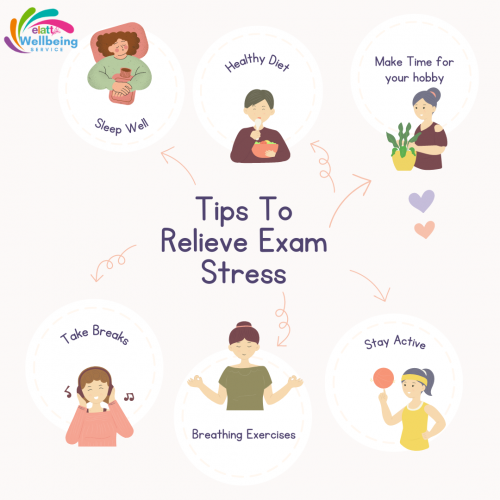

Exams can be a stressful period, with the pressure to perform often leading to a heavy toll on both physical and mental health. Recognizing this, our Wellbeing Service is committed to providing you with support and guidance to navigate this challenging time. Our dedicated Workshop Leaders have curated a range of effective techniques and insightful advice to empower you in maintaining a balanced and healthy mindset.
From mindful practices to help you stay present and focused, to advice on maintaining a healthy lifestyle that supports your cognitive function and energy levels, our Wellbeing Service is here to ensure you are not alone in this journey. We believe that your wellbeing is as essential as your success, and we are here to help you strike a balance between the two.
Remember, it’s not just about getting through your exams; it’s about developing sustainable habits and strategies that support your overall wellbeing in the long term. We hope that these techniques and tips from our Workshop Leaders will not only help you during this exam period but also equip you with valuable skills for managing stress and maintaining wellbeing in your future endeavours.
ELATT Wellbeing Officer, Mindfulness & Compassion Teacher, Yoga Instructor
Breathing exercises can help to reduce stress and increase concentration. Here are a few you might find useful:
Please note: If you’re pregnant or have a breath-related condition like asthma, please do not attempt the breathing exercises!

This is a simple technique that can help you refocus and alleviate anxiety by bringing your attention to the present moment. By bringing awareness to your surroundings and engaging your senses, you create a grounding effect that helps you regain control and calm your mind. You can use this practice to calm down if you are feeling anxious.
Follow these steps:
By engaging all of your senses in this exercise, you create a powerful anchor to the present moment, effectively reducing anxiety and helping you regain a sense of calm. The 5-4-3-2-1 grounding exercise can be performed anywhere and at any time, making it an invaluable tool to have in your mental health toolkit.
Ex ELATT Student and Wellbeing Workshop Leader
Eat a healthy diet: Eating a healthy diet can help you feel better physically and mentally. Make sure to include plenty of fruits, vegetables, and whole grains in your diet. These foods packed with nutrients help improve your mood, concentration, and energy levels.
Stay Hydrated: Drink plenty of water throughout the day to stay hydrated. Dehydration can lead to fatigue and difficulty in focusing. Water can help to improve concentration and energy levels.
Stay Active: Exercise is a great way to relieve stress, improve your mood and increase focus. Aim for at least 30 minutes of moderate-intensity exercise most days of the week.
Sleep well: When you’re well-rested, you’re better able to cope with stress and perform at your best. Aim for 7-8 hours of sleep each night.
Easiest to say than to do? So don’t forget to:
Take Breaks and Relax: When you’re feeling stressed, it’s important to take breaks. Allow yourself regular breaks to relax and recharge. It helps clear your head and come back to your studies refreshed. Engage in activities you enjoy, such as hobbies, listening to music, or spending time with loved ones.
Seek Support: Reach out to friends, family, or teachers for emotional support. Sharing your concerns and seeking advice can help alleviate stress.
ELATT Student and Wellbeing Workshop Leader
Exams can be stressful on their own, but other things might cause you to feel worse. These might include Feeling like you’re not ready or prepared for exams, like leaving revision too late. Worrying about how you’ll feel and perform during the exam, especially when you don’t know what will be in.
Keep gaps between revisions and drink lots of water. Try not to stress and revise the day before exams. Rather than copying notes, draw mind maps or images to help you remember information. Don’t put so much pressure on yourself, take a deep breath.
While revising, focus on the one topic you’re revising now, not on what else you still must cover. If you get stuck on a topic, leave it and come back when you’re fresh. Ask for help from students, your tutor or your student support team if you need it.
If stress affects you, try to find ways to maintain a positive attitude and cultivate a positive approach during your revision. You could
If I begin to panic during the exam, I say to myself STOP and then sit back and take several deep breaths to try to relax a little.
© ELATT 2024 | East London Advanced Technology Training (ELATT) is a registered charity in England and Wales 299186, registered company 01812908